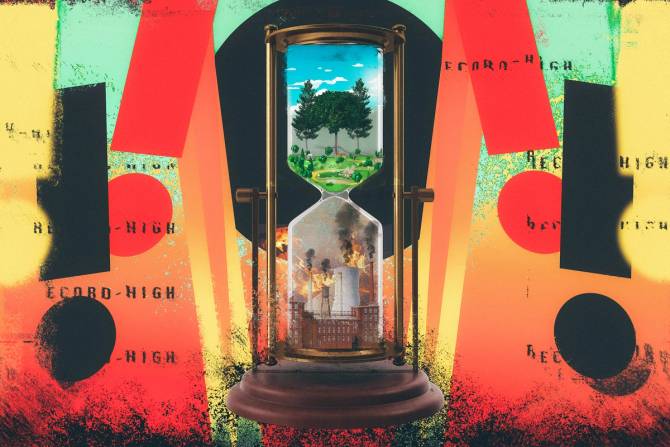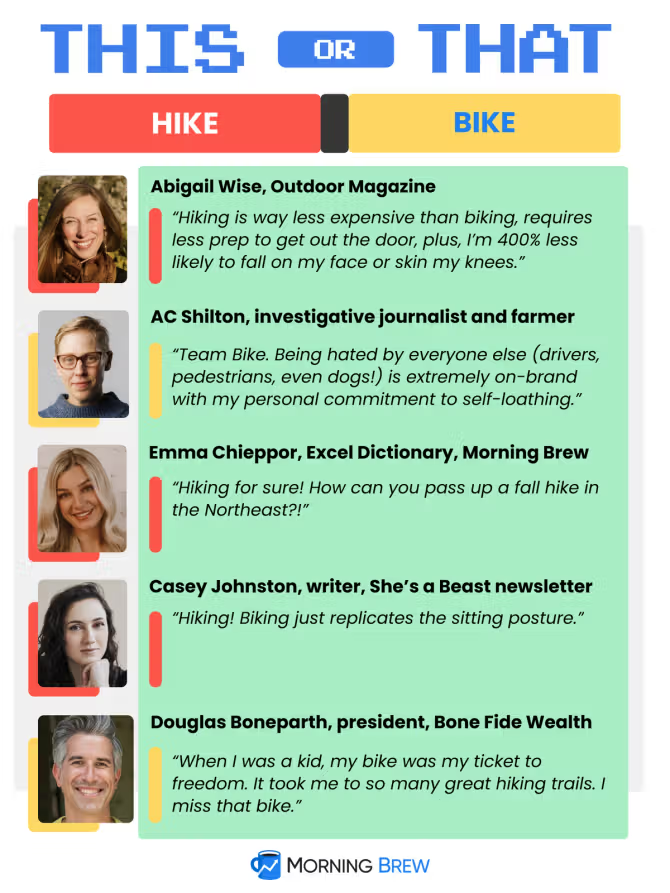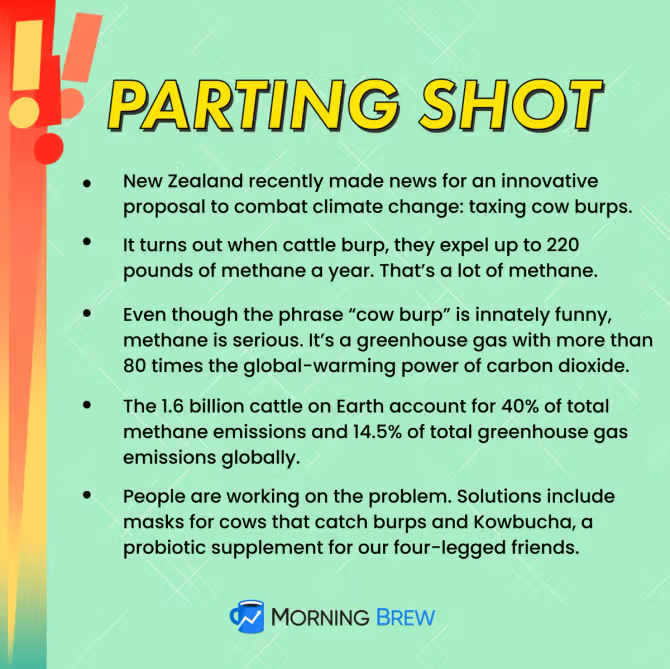| | | | | |  Grant Thomas | | IN THIS ISSUE | Web3 looks to carbon credits | A new generation of storm chasers | Bear Grylls fills out the Questionnaire | | | | "I'm literally as basic as people think I am. Like, pumpkin spice, fall leaves, cardigan sweaters, blanket scarves."—"Christian Girl Autumn" influencer Caitlin Covington to the New York Times "I've had enough of talentless people."—Tory MP Charles Walker to the BBC after the Wednesday night parliamentary disaster that preceded Liz Truss's resignation "Truss will be the shortest-serving prime minister in UK history." —The Guardian's report on Truss's Thursday morning resignation | | |  —Sherry Qin | | | While not as splashy as soup on Van Gogh's "Sunflowers," carbon credits and offsets are also hot topics in the climate conversation. Corporations from British Airways to Disney to Shell have employed them as part of their climate strategy. Offsets and credits are used interchangeably, but they're not exactly the same thing, and the difference is important—especially to Web3 companies that want to capitalize on the growing market. Carbon offsets "are used to address direct and indirect greenhouse gas emissions by verifying global emissions reductions at additional, external projects," the Environmental Protection Agency told Morning Brew. These projects can include everything from designing more eco-friendly buildings, planting trees, preserving forests, or capturing existing carbon dioxide from the environment. The subsequent offsets are factored into an organization's total emissions, meaning that offsets can be used to lower net emissions in annual reporting and disclosures. A carbon credit, meanwhile, is a tradeable certificate created by a government when one ton of carbon dioxide has been reduced or removed from the environment. They are sometimes called "allowances," because they usually allow the holder to emit one metric ton of carbon dioxide in exchange. Thanks to corporate aspirations to be more environmentally responsible, voluntary carbon markets, which allow corporations to purchase carbon credits, were worth nearly $2 billion last year. Carbon offsets and credits have both supporters and detractors. The EPA said that offsets are just "one tool" to reduce emissions. But the agency made clear that offsets are truly effective only if an organization has reviewed and employed energy efficiency, switched to renewable energy, and "electrified any processes associated with the direct combustion of fuels which generate emissions." In other words, offsets and credits on their own are not enough. While committing to forest preservation and reducing net emissions is a valiant effort, carbon credits and offsets have been criticized by climate experts for being a "license to pollute" while redirecting funds that could be spent on more sustainable climate-protecting initiatives. As the arguments over offsets continue, Web3 companies have stepped in to capitalize. There's a clear opportunity: McKinsey predicts the carbon credit market could reach $50 billion by 2030. Toucan tokenizes carbon credits. Another company, AirCarbon Exchange, wants to make carbon credits more like commodities trading "using distributed ledger technology." As the carbon market is introduced to the blockchain, it will become even more contested: Verra, an organization that creates standards for environmental efforts like the carbon market, recently completed a 60-day "public consultation," which sought to learn "how to identify and implement anti-fraud measures" in the crypto-slash-carbon marketplace. With the Web3 layer on top, it's difficult to parse what's real and what is just hot air when it comes to carbon offsets. It's kind of like trying to interpret a painting covered in soup. —Ashwin Rodrigues | | | Taylor Swift, Liz Truss, and EVs: This is our Sunday crossword that nods to the news of the week. Play it here. | | | | | | Your money can do more than hang around in your bank account. With ESG investing, you can support companies that meet specific environmental, social, and governance standards. That means your investments can play a role in reducing greenhouse gas emissions, enforcing ethical business practices, and supporting DE&I practices. Choosing which stocks to invest in can be an overwhelming and stressful process. But ESG investing can help you narrow the scope and invest in your beliefs. If you're thinking, "That all sounds great, but it's still a lot of research to do," well, don't sweat it. The Motley Fool Stock Advisor has a list of 5 growth stocks under $49. Download it for free here. | | | | Grant Thomas Mark Sudduth was en route from North Carolina to Nova Scotia last month when he changed course suddenly in Philadelphia to head south. He had already driven more than 500 miles to document incoming Hurricane Fiona in Canada, but after watching the changing weather patterns, he saw a bigger storm coming. It was Hurricane Ian, poised to make landfall on Florida's west coast. Sudduth drove to Punta Gorda, Captiva, Fort Myers, and Cape Coral, where he set up 17 livestreaming cameras to capture footage of the devastating hurricane, then drove to Orlando to wait out the worst of the storm. His camera captured trees bending in the wind, downed power lines, and destruction caused by rushing floodwaters. He posted his footage, which included live streams and forecast explainers, all over Twitter, YouTube, and his website, where people come for extensive storm footage. This is what Sudduth does. He's not a meteorologist, and he doesn't work for The Weather Channel or broadcast news. He's a crowdfunded, self-driven hurricane tracker, and he has reached millions of people with his forecasts and footage of storms and their devastation through social media. It's a sober, fact-based forecast, without the alarmist predictions that can paint every incoming storm as the next apocalyptic one and send people rushing to grocery stores to stock up on toilet paper. And that, Sudduth said, is why people come to him. "It is what it is. There's no hype, there's no clickbait thumbnails—none of that," Sudduth told Morning Brew. "And I think people trust that and they just feel like they can relate to me, that I'm just a guy that really is passionate about this." Social media is becoming a go-to weather source for specific weather predictions—from severe storms like hurricanes or wildfires to the mundane hyperlocal. Sudduth's account @HurricaneTrack is part of an expanding niche of weather enthusiasts who have become authorities for their small-but-growing audiences who are willing to fund their work via Patreon. The heightened attention makes sense: As natural disasters intensify due to climate change, people are clamoring for clear information about how an incoming storm might impact them personally. Some are crowdsourcing information on wildfires in California, and researchers are working on an app that will provide local weather forecasts in the context of climate change. Extreme weather makes people more anxious, and anxious people want to encounter calm and clear answers as they doomscroll. As information is increasingly expected to be instant and personalized, traditional weather forecasts and government sources aren't cutting it—either in the depth of information they explain, the number of times they post, or in the personality they bring—and these forecasters fill a void. Private companies use National Weather Service data to fuel their apps and forecasts, but the government can't act as a competitor, and it doesn't exactly have its own weather app. That leaves a sizable gap for amateurs to fill. "The weather service has traditionally been somewhat limited in forecasting for specific purposes, because they're not a job shop, they're serving the country," said Bob Henson, a meteorologist and journalist with Yale Climate Connections who wrote Weather on the Air: A History of Broadcast Meteorology. "So it's no surprise that more cottage industries have developed around forecasts for very specific things." Some such meteorologists have become consultants who forecast for events, like airshows, and some are building their own brands on social media. Weather forecasting has always been communal in a sense, ever since it began in earnest more than 170 years ago. Around 150 volunteer weather observers joined forces under the Smithsonian Institution in 1849 to track and report the weather near them. (The National Weather Service still has a Citizen Weather Observer Program, consisting of about 9,000 members who have data automatically sent from weather stations set up at their homes.) Continue reading this story by Amanda Hoover on the newest generation of storm chasers. | | | Broomvector Bear Grylls is a former UK Special Forces soldier, an Emmy winner, and an all-around nature expert. You probably know him from the hit TV show Man vs. Wild. His latest show, Running Wild with Bear Grylls: The Challenge, finds the adventurer alongside Simu Liu, Florence Pugh, and other celebrities as they do various wilderness things. It's streaming now on National Geographic and Disney+. What's the best advice you ever received?
The storms of life make us stronger. Embrace them. What's the most embarrassing song you'll admit to liking publicly? Queen's "We Are The Champions"! What fictional person do you wish were real?
Robin Hood. What real person do you wish were fictional?
Sybil, our small imperial Shih Tzu, could be turned into Super Sybil! The family would love that. How would you explain TikTok to your great-grandparents?
A photo album that moves and makes noises! What always makes you laugh?
Rob Riggle's stories around a campfire. If you were given a billboard in Times Square, what would you put on it?
The words "love your neighbor." —Interview by Ashwin Rodrigues | | | | | | These seeds could grow money trees. The Motley Fool Stock Advisor doesn't recommend "Double Down" stock picks often, so when they do, it's kind of a big deal. Why? Because investors see an average return of 340% on these stocks. They just released fresh picks for 2022. Check 'em out. | | | | Learn about the tax-saving strategies of the uber-wealthy. [Money Scoop] Here are 20 of the most innovative entrepreneurs who should be on your radar. [Sidekick] Did you know that Chipotle has a $50 million venture fund to invest in next-gen food tech? Take a look at where that money is going. [Emerging Tech Brew] Logistics giant DHL went all-in on electric vehicles. We found out what one driver thinks of it. [Retail Brew] How to invest with the S&P down 25% YTD, 40-year-high inflation, and rate hike after rate hike. [Money with Katie] Quitting is an important professional skill worth developing. [Business Casual] On the latest episode of Good Work, the boss was so desperate for employees to go back to the office that he offered his employees a free shuttle service (he started kidnapping them). [Morning Brew] The best thing we read this week: According to a new study, we're nothing but a big, smelly protein shake to hungry mosquitoes. [Washington Post] Timing can be everything: It's all about making the right move at the right time. And The Motley Fool has a seriously impressive track record of IDing stocks with major long-term potential. See their latest pick here.* *This is sponsored advertising content. | | |  —Rohan Anthony |  | Written by Rohan Anthony, Stassa Edwards, Amanda Hoover, Sherry Qin, Ashwin Rodrigues, and Holly Van Leuven Was this email forwarded to you? Sign up here WANT MORE BREW? Industry news, with a sense of humor → - CFO Brew: your go-to source for global finance insights
- Emerging Tech Brew: AI, crypto, space, autonomous vehicles, and more
- Future Social: the Brew's take on the world of social media
- Healthcare Brew: the comprehensive industry guide for administrators, medical professionals, and more
- HR Brew: analysis of the employee-employer relationship
- IT Brew: moving business forward; innovation analysis for the CTO, CIO & every IT pro in-between
- Marketing Brew: the buzziest happenings in marketing and advertising
- Retail Brew: retail trends from DTC to "buy now, pay later"
Tips for smarter living →  Podcasts → Business Casual, Founder's Journal, Imposters, and The Money with Katie Show Podcasts → Business Casual, Founder's Journal, Imposters, and The Money with Katie Show  YouTube YouTube Accelerate Your Career with our Courses → | ADVERTISE // CAREERS // SHOP // FAQ
Update your email preferences or unsubscribe here.
View our privacy policy here.
Copyright © 2022 Morning Brew. All rights reserved.
22 W 19th St, 4th Floor, New York, NY 10011 | | |
No comments:
Post a Comment